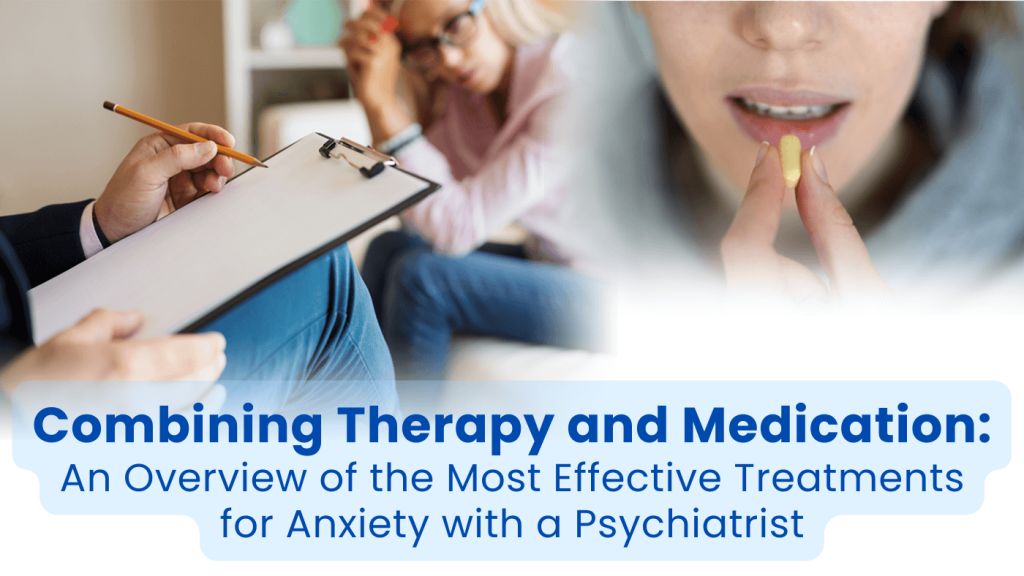Anxiety is a serious mental health issue that impacts people of all ages and backgrounds. It can cause a wide range of symptoms, including racing heartbeat, difficulty breathing, feeling like you’re going to pass out or throw up—even though you aren’t—and more. Some people have anxiety symptoms so severe that they interfere with daily life and require professional treatment from their doctor. If you think that therapy and medication are both options for treating your anxiety, keep reading!
Finding the right treatment for anxiety isn’t always easy.
You may have tried therapy or medication in the past, but that doesn’t mean you should give up on finding your ideal treatment plan. There are many different types of anxiety, and each person’s experience with it is unique. Some people find that medication is more effective than counseling, while others struggle with getting help from their doctor. It’s important to remember that there are many options available when it comes to finding relief from your symptoms–you just need to find what works best for YOU!
Finding a Psychiatrist: How Do I Find One Near Me?
If you live in America and want help finding local psychiatrists who specialize in treating mental health conditions like depression or bipolar disorder (and perhaps even anxiety), here are some things worth considering:
Therapy is a good first step.
Therapy is a good first step in treating anxiety. It can help you understand the root of your anxiety, develop healthy coping skills, and develop a better understanding of yourself and your anxiety.
If you decide to pursue therapy as part of your treatment plan for anxiety, make sure that it’s the right fit for you. Talk with friends who have had similar experiences for recommendations on therapists they liked or didn’t like so much; also look at reviews on sites like Yelp! or ZocDoc (which includes information from other patients). You should feel comfortable enough with a therapist before starting sessions–if not, keep looking until one feels right!
If you begin to feel better from therapy alone, then there’s no need to seek out medication.
Therapy can be a good first step for many people who want to deal with their anxiety issues without taking any kind of medication. However, some people may find that they still have symptoms even after they’ve been in therapy for several months or years. If this happens to you and your therapist recommends that you try medication as well as continuing with therapy sessions, it’s important not to feel guilty about it! There’s nothing wrong with wanting to use both therapies at once if it helps reduce your symptoms faster than using only one method would on its own.
A combination of therapy and medication may help you overcome your anxiety faster and more effectively.
Medication can be used in combination with therapy and is often the best way to get back to your normal life. Medication can help you overcome your anxiety faster, but it’s important to know that it’s not a cure-all. If you decide that medication is right for you, talk to your psychiatrist about how much time you should spend in therapy before starting or after stopping your medication.
In addition to its use as an adjunct treatment for depression, selective serotonin reuptake inhibitors (SSRIs) are also a popular choice among psychiatrists when treating patients who suffer from generalized anxiety disorder (GAD). These medications work by increasing serotonin levels in the brain; Serotonin plays an important role in regulating mood and sleep cycles while decreasing feelings of anxiety.
Side effects associated with SSRIs include nausea and headaches during initial usage; however these side effects tend not to last long once they’ve been taken regularly over time
If you are interested in medication as a treatment for your anxiety, it should be used only as part of a long-term treatment plan that includes therapy.
The emotional and social aspects of anxiety are often difficult to address on their own, but they can be successfully treated with psychotherapy. Therapy can help you deal with the stressors that trigger your anxiety symptoms and learn how to manage those feelings more effectively.
Psychiatrists offer many different types of psychotherapy (such as cognitive behavioral therapy [CBT] or interpersonal therapy), which aim to reduce symptoms by changing how we think about things or interact with others. Medications may also be helpful in reducing physical symptoms like muscle tension or rapid heartbeat; however, these drugs aren’t intended to cure the problem itself–they’re simply Band-Aids for when it becomes too much for us humans!
When making decisions about medication, keep these things in mind:
What is the purpose of the medication?
Some medications are used to treat anxiety disorders directly and others are used to improve other symptoms (such as depression) that may occur along with an anxiety disorder. The most common types of medications prescribed for anxiety disorders include antidepressants and antianxiety agents. Antidepressants can be helpful if you experience symptoms like depressed mood or loss of interest in activities that were once enjoyable to you. Antianxiety agents help reduce excessive worry and agitation associated with panic disorder, generalized anxiety disorder (GAD), social phobia and obsessive-compulsive disorder (OCD). It’s important not only for doctors but also patients themselves to understand what each drug does so they can make informed decisions about whether or not it’s right for them.
Your doctor can help you find a treatment plan that works well for your specific needs
You should work with a psychiatrist who specializes in anxiety.
You shouldn’t self-medicate.
You shouldn’t start taking medication without talking to your doctor first.
MedPsych Integrated
If you’re currently struggling with anxiety, it’s important to remember that there are many options available for treating this condition. You don’t have to suffer in silence or try to manage alone. Getting help from a psychiatrist can not only provide you with some much-needed relief from symptoms but also give you guidance on how best to manage them in the future so they don’t interfere with your daily life again.
At MedPsych Integrated, we’re committed to helping you overcome your anxiety challenges. Our proficient psychiatrists excel in managing anxiety with the kind of understanding, empathy, and effective treatment you need.
Reach out to MedPsych Integrated, because the path to a better, anxiety-free life begins here.




